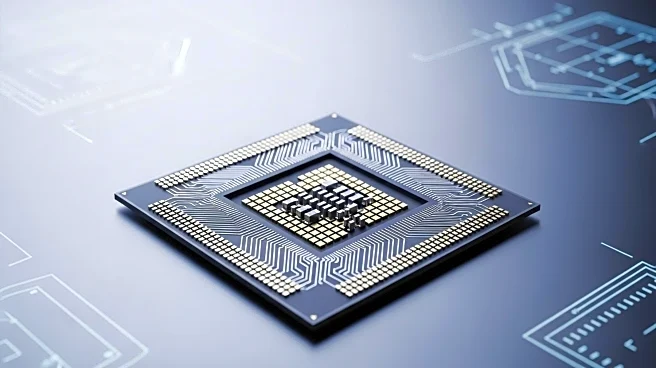What is the story about?
What's Happening?
Intel's stock experienced a decline of nearly 2.5% following new reports about a government deal structured under the CHIPS Act. The deal includes a five-year warrant allowing the government to purchase an additional 5% of Intel stock at $20 per share if Intel's ownership in its foundry business falls below 51%. Intel's CFO, David Zinsner, expressed confidence that the company would maintain its stake above 50%, suggesting the warrant might expire without activation. Additionally, Intel admitted shortcomings in its Arrow Lake gaming processors, with Zinsner acknowledging the Core Ultra 200 processors as not being a strong offering. Intel aims to improve its position in the desktop space with its upcoming Nova Lake processors.
Why It's Important?
The government deal and Intel's performance issues highlight significant challenges for the company in maintaining its competitive edge in the semiconductor industry. The structured deal under the CHIPS Act reflects the government's strategic interest in Intel's operations, potentially influencing future business decisions. Intel's admission of processor shortcomings underscores the competitive pressure from rivals like AMD, emphasizing the need for innovation and quality improvement to regain market share. The developments could impact investor confidence and Intel's stock performance, affecting stakeholders in the tech and semiconductor sectors.
What's Next?
Intel plans to address its processor quality issues with the introduction of Nova Lake processors, aiming to enhance its position in the desktop and gaming markets. The company's ability to maintain its foundry business stake above 50% will determine the activation of the government warrant, influencing future stock dynamics. Analysts currently hold a consensus rating of 'Hold' for Intel stock, with expectations of an 8.84% downside risk based on recent price targets. Intel's strategic moves and product developments will be closely watched by investors and industry analysts.
Beyond the Headlines
The structured government deal under the CHIPS Act raises questions about the balance between public investment and corporate autonomy in the tech industry. Intel's processor challenges highlight the rapid pace of innovation required to stay competitive, reflecting broader industry trends towards high-performance computing and gaming. The company's strategic response to these challenges will be crucial in shaping its future market position and investor relations.

















